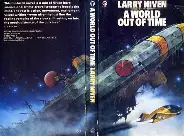Fictional futures are manifold. Poul Anderson wrote more future history series than anyone else plus many non-series works set in alternative fictional futures. James Blish ended the universe in 4004 AD (or 4104 AD) in his
Cities In Flight Tetralogy but also imagined it as surviving for many more millennia beyond that year in his
The Seedling Stars and until 25,000 AD and beyond in
Midsummer Century. These observations are occasioned by the realization that Larry Niven's single novel,
A World Out Of Time,
sketches a history of the Solar System markedly different from the more familiar sequence of events chronicled in the same author's Known Space series with its Man-Kzin Wars and Ringworld. We can spend time conceptually either within a single future history series or by comparing several future histories.
But a new history can be initiated by anyone at any time. All that they need is a blank sheet of paper or a blank computer screen. Write a date: 2125. Then write something that might have happened by then. Write a much later date, 3125. Then imagine what might have happened between the starting point and that later date. Do not assume anything, certainly not space travel. If you do assume space travel, then examine its funding, purpose, logistics, means of propulsion, supporting technology etc.
Many of us cannot do most of that or at least cannot do it well. Our creations will not match up to those of successful professional sf writers. But a new future history series, even an appallingly bad one, can begin at any time with a blank computer screen...

2 comments:
I always use alternate histories for future settings, if they're anywhere near the present. Predicting the future is a mug's game because history is full of low-probability accidents.
Kaor, Mr. Stirling!
I'll say! Examples being the improbable coincidences leading to Archduke Francis Ferdinand's assassination in 1914 or Hitler surviving WW I. The Devil worked hard to make sure Adolf escaped all the dangers he ran!
Ad astra! Sean
Post a Comment